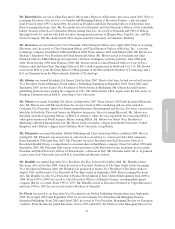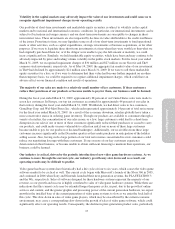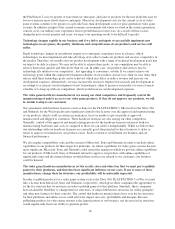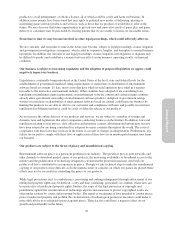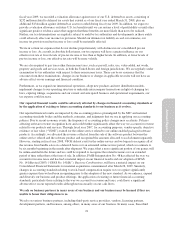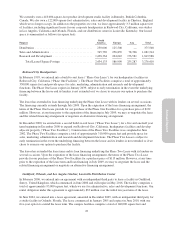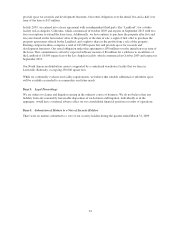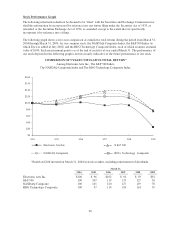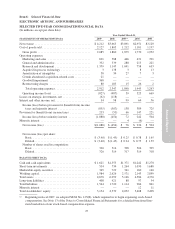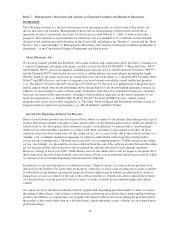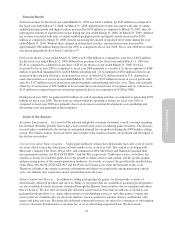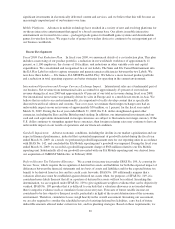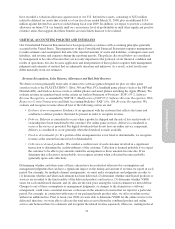Electronic Arts 2009 Annual Report Download - page 101
Download and view the complete annual report
Please find page 101 of the 2009 Electronic Arts annual report below. You can navigate through the pages in the report by either clicking on the pages listed below, or by using the keyword search tool below to find specific information within the annual report.
Annual Report
fiscal year 2009, we recorded a valuation allowance against most of our U.S. deferred tax assets, consisting of
$232 million related to deferred tax assets that existed as of our fiscal year ended March 31, 2008, plus an
additional $134 million against deferred tax assets recorded during fiscal year 2009. In addition, we expect to
provide a valuation allowance on future U.S. tax benefits until we can sustain a level of profitability or until other
significant positive evidence arises that suggests that these benefits are more likely than not to be realized.
Further, our tax determinations are regularly subject to audit by tax authorities and developments in those audits
could adversely affect our income tax provision. Should our ultimate tax liability exceed our estimates, our
income tax provision and net income or loss could be materially affected.
We incur certain tax expenses that do not decline proportionately with declines in our consolidated pre-tax
income or loss. As a result, in absolute dollar terms, our tax expense will have a greater influence on our
effective tax rate at lower levels of pre-tax income or loss than at higher levels. In addition, at lower levels of
pre-tax income or loss, our effective tax rate will be more volatile.
We are also required to pay taxes other than income taxes, such as payroll, sales, use, value-added, net worth,
property and goods and services taxes, in both the United States and foreign jurisdictions. We are regularly under
examination by tax authorities with respect to these non-income taxes. There can be no assurance that the
outcomes from these examinations, changes in our business or changes in applicable tax rules will not have an
adverse effect on our earnings and financial condition.
Furthermore, as we expand our international operations, adopt new products and new distribution models,
implement changes to our operating structure or undertake intercompany transactions in light of changing tax
laws, expiring rulings, acquisitions and our current and anticipated business and operational requirements, our
tax expense could increase.
Our reported financial results could be adversely affected by changes in financial accounting standards or
by the application of existing or future accounting standards to our business as it evolves.
Our reported financial results are impacted by the accounting policies promulgated by the SEC and national
accounting standards bodies and the methods, estimates, and judgments that we use in applying our accounting
policies. Due to recent economic events, the frequency of accounting policy changes may accelerate. Policies
affecting software revenue recognition have and could further significantly affect the way we account for revenue
related to our products and services. Through fiscal year 2007, for accounting purposes, vendor-specific objective
evidence of fair value (“VSOE”) existed for the online service related to our online-enabled packaged software
products. Accordingly, we allocated the revenue collected from the sale of the software product between the
online service offered and the software product and recognized the amounts allocated to each element separately.
However, starting in fiscal year 2008, VSOE did not exist for the online service and we began to recognize all of
the revenue from bundle sales on a deferred basis over an estimated online service period, which we estimate to
be six months beginning in the month after shipment. We expect that a more significant portion of our games will
be online-enabled in the future and we could be required to recognize the related revenue over an extended
period of time rather than at the time of sale. In addition, FASB Interpretation No. 48 has affected the way we
account for income taxes and has had a material impact on our financial results and our adoption of SFAS
No. 141(Revised 2007) (“SFAS No. 141(R)”), Business Combinations, will have a material impact on our
Consolidated Financial Statements for material acquisitions consummated after March 28, 2009. Similarly,
changes in accounting standards relating to stock-based compensation require us to recognize significantly
greater expense than we had been recognizing prior to the adoption of the new standard. As we enhance, expand
and diversify our business and product offerings, the application of existing or future financial accounting
standards, particularly those relating to the way we account for revenue and taxes, could have a significant
adverse effect on our reported results although not necessarily on our cash flows.
We rely on business partners in many areas of our business and our business may be harmed if they are
unable to honor their obligations to us.
We rely on various business partners, including third-party service providers, vendors, licensing partners,
development partners, and licensees, among others, in many areas of our business. In many cases, these third
21


